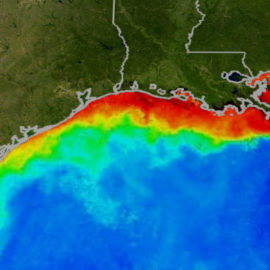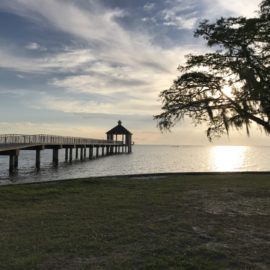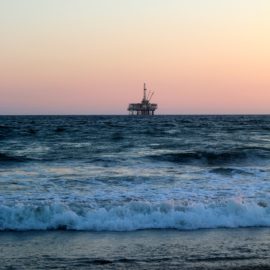Nearly 200 Community Groups Urge No New Leases in Biden’s Five Year Plan
While Big Oil profits, more drilling promises irreversible suffering, environmental injustice for Gulf and Alaska communities
Greater New Orleans Interfaith Climate Coalition is honored to join community organizations across the country in sending a letter to the Biden administration. We are demanding no new leases in the Interior Department’s Five Year Plan for offshore drilling as part of the program’s public comment period ending October 6.
The 193 groups — including 48 from the Gulf of Mexico and Alaska — are firmly united against any offshore drilling proposal that further exacerbates the global climate crisis and guarantees generations of environmental devastation for coastal and Indigenous communities.
The Biden administration’s initial plan potentially offers 95+ million acres for offshore drilling, including 10 lease sales in the Gulf of Mexico and one in Alaska’s Cook Inlet. This would expose large swaths of the country to ecological disasters like oil spills and harmful health impacts like asthma, despite President Biden’s initial promise to end new leasing on federal lands and waters. However, the Biden administration can still choose not to offer new leases in the final Five Year Plan.
As climate change-induced storms and flooding ravage places like Florida, Puerto Rico and Pakistan, locking in more oil and gas development would result in environmental catastrophe and further cement Gulf and Alaska communities as unjust sacrifice zones for the fossil fuel industry. Our groups are imploring the Biden administration to prioritize people, ecosystems and the planet over Big Oil by choosing no new leases in its next Five Year Plan.
Quotes from groups:
“Gulf communities have suffered for the country’s inability to transition away from fossil fuels,” said Cynthia Sarthou, Executive Director of Healthy Gulf. “It is time to stop issuing new leases for oil and gas development in Gulf and instead, invest in renewable energy that supports a Just transition for the people of the Gulf”
“Once again, the Gulf Coast has been named a sacrifice zone,” said Joanie Steinhaus, Gulf Program Director at Turtle Island Restoration. “I have worked in Texas my entire life and witnessed first-hand the impacts from the fossil fuel industry on the health of frontline communities, the lowering of property values and environmental degradation. Enough is enough, no new leases”.
“The Earth is sacred and must be protected. For our own good and for the wellbeing of all species, we must curtail drilling and move rapidly to other sources of energy,” said Bart Everson, Communications Team Leader at Greater New Orleans Interfaith Climate Coalition. “Above all, humanity must learn to live more lightly on the Earth.”
“Alaskan economies, subsistence, tourism, and health depend upon our lands and waters,” said Taylor Kendal Smith, Communications Director at Cook Inletkeeper. “We have stood up repeatedly to say no to oil and gas leasing in our waters and frontline communities cannot afford for us to continue down this path. Every oil spill begins with a lease sale and that is not the story we want to tell our future generations.”
“Since SouthWings deepened our commitment to the Gulf Coast during the BP Deepwater Horizon oil disaster, we have seen firsthand many of the burdens of oil extraction on Gulf communities. Canals, pipelines, spills, and dispersants continue to pollute and cause the Gulf coast to lose massive amounts of land. This land is home to some of the most vulnerable and culturally rich communities, including many federally unrecognized Indigenous peoples whose very identities are inextricably tied to the land and water,”said Virginia Richard, Gulf Program Manager at SouthWings. “Generations of people on the Gulf coast have borne the burdens of fossil fuel and dispersant pollution with little to no help from responsible parties. In an era when we can plainly see that climate chaos is escalating and we know that we must reduce emissions immediately and drastically, continued fossil fuel extraction is a universal and existential threat.”
“In 2010, the gulf coast region of Florida was devastated by the BP Oil spill that caused 4.9 million barrels of oil to leak into the Gulf, making it the largest oil spill in U.S. History. Twelve years later, our Gulf has not recovered and our coastal communities are still feeling the direct and indirect impacts of our fossil fuel addiction. Hurricane Irma, Michael and now Ian are a testament of that,” said Yoca Arditi-Rocha, Executive Director at the CLEO Institute. “Gulf communities have consistently faced devastating socio-economic and health related impacts from oil spills and climate catastrophes. Instead of investing in an energy sector that has time and time again harmed and failed our communities, it is time we invest in making a just transition to 100% clean renewable energy like Solar. We can achieve energy independence, protect our frontline communities from future disasters, and live up to our name, the Sunshine State.”
“With rising sea levels causing more frequent and extreme storms, offshore drilling forces coastal communities right into the climate crisis’ line of fire,” said Raena Garcia, Fossil Fuels and Lands Campaigner at Friends of the Earth. “People and ecosystems are enduring tremendous harm at the expense of the fossil fuel industry’s ballooning wealth. We cannot continue down a path that overlooks the irreversible damage of Big Oil.”



